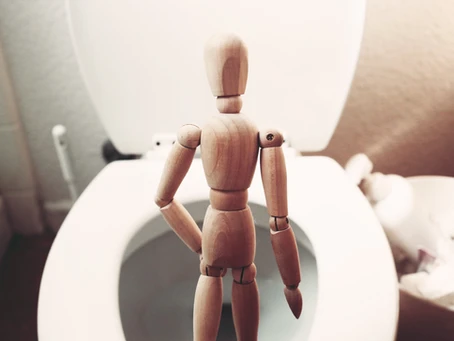Is my bathroom schedule normal? Do I have an overactive bladder?
That’s a great question…let’s talk about it.
Daytime Urination
The average number of trips to the bathroom per day for an adult (under the age of 65) is 6-8. If you pee less than 6 times or way more than 6 times and you are having bladder symptoms, then it may be helpful for you to have a voiding schedule. This means trying to go to the bathroom every 2-4 hours to assist with decreasing your urinary frequency symptoms. If you change your peeing schedule and still have symptoms, consider seeing a pelvic health therapist (a healthcare provider specifically trained to assist with frequent urination) to assist you in your goals.
Nighttime Urination
The average urinary frequency for an adult (under the age of 65) is 0-1 times per night and 1-2 times per night for an adult (over the age of 65). This means once you lie down to go to sleep, you only wake up once or not at all in the middle of the night. If you find you are peeing multiple times before you fall asleep or you wake up to pee more than once per night, this habit may be contributing to your urinary symptoms and can cause poor sleep hygiene. One tip you can try right away is to stop drinking any amounts of water or fluid two hours before your normal bedtime. If this doesn’t help, consider seeing a pelvic health therapist to assist you in your goals.
Bladder Irritants
There are certain foods and beverages that can be irritating to your bladder, causing you to pee more often and causing you to have urine leakage. The bladder wall is similar to the smooth tissue you feel when you rub your tongue inside your cheek. Because of the sensitivity of your bladder, if a substance irritates that smooth tissue, your bladder will tell your brain to “get this out,” which you interpret as bladder pressure. This creates a need for frequent urination with a strong sense of urinary urgency. Here is a list of common bladder irritants.
Dairy
Caffeine
Chocolate
Citrus fruits or drinks
Spicy foods
Tomato-based products
Carbonation (soda and sparkling waters)
Alcohol
Water Intake
The average recommended amount of water intake in a 24-hour period is 64 oz. This means plain water, no additives, carbonation, or flavoring. This amount will depend on the climate you live in, if you exercise that day, and if you are breastfeeding. Drinking this amount of water helps to keep your bladder from irritation and helps to keep your bowel movements regular.
Tips for Healthy Urinary Frequency:
- For pelvises with vaginas, try to sit when you pee. If you have urinary symptoms including incontinence, and incomplete emptying (just to name a few), hovering over the toilet could contribute to your symptoms. Sitting down helps those pelvic and bladder muscles.
- If you have water triggers that cause you to have a strong urge to pee when you put your hands under running water, when you get in the shower or near a swimming pool, I would encourage you to avoid peeing in the shower. Your mind can start to associate the sound of running water with the flow of urine. Similarly, if you have a strong urge to pee when you put your key in the door to your house or apartment, this is considered another type of trigger. I would recommend seeing a pelvic health PT or other healthcare provider.
- Be sure to give yourself enough time to completely empty your bladder when you sit to pee. Avoid peeing in a hurry and not completely emptying prior to wiping.
If any of these topics hit close to home for you or after reading you think you may need to see a Pelvic Health PT, email me at colleen@bereadypt.com or schedule a call with me from our website to discuss your symptoms.
Sincerely,
Colleen Gensheimer
PT, DPT, Obstetric Trained, Pelvic Health Trained
Be Ready Performance Therapy


